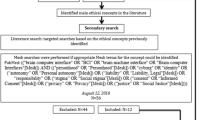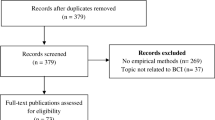Abstract
Nervous system disorders are among the most severe disorders. Significant breakthroughs in contemporary clinical practice may provide brain-computer interfaces (BCIs) and neuroprostheses (NPs). The aim of this article is to investigate the extent to which the ethical considerations in the clinical application of brain-computer interfaces and associated threats are being identified. Ethical considerations and implications may significantly influence further development of BCIs and NPs. Moreover, there is significant public interest in supervising this development. Awareness of BCIs’ and NPs’ threats and limitations allow for wise planning and management in further clinical practice, especially in the area of long-term neurorehabilitation and care.
Similar content being viewed by others
References
Mikołajewska E., Mikołajewski D., Neuroprostheses for increasing disabled patients’ mobility and control, Adv Clin Exp Med, 2012, 21, 263–272
Mikołajewska E., Mikołajewski D., Technical and medical problems concerning wider use of neuroprostheses in patients with neurologic disorders, JNNN, 2012, 1, 119–123
Hansson S. O., Implant ethics, J Med Ethics, 2005, 31, 519–525
Clausen J., Moving minds: ethical aspects of neural motor prostheses, Biotechnol J, 2008, 3, 1493–1501
Saha S., Chhatbar P., The future of implantable neuroprosthetic devices: ethical considerations, J Long Term Eff Med Implants, 2009, 19, 123–137
Glannon W., Stimulating brains, altering minds, J Med Ethics, 2009, 35, 289–292
Ford P. J., Kubu C. S., Stimulating debate: ethics in a multidisciplinary functional neurosurgery committee, J Med Ethics, 2006, 32, 106–109
Mikołajewska E., Biofeedback as the element of the neurorehabilitation, J Health Sci, 2012, 2, 135–148
Xu J., Shen L. X., Yan C. H., et al. Personal characteristics related to the risk of adolescent internet addiction: a survey in Shanghai, China. BMC Public Health, 2012, 12: 1106
Heinz A., Kipke R., Heimann H., et al., Cognitive neuroenhancement: false assumptions in the ethical debate, J Med Ethics, 2012, 38, 372–375
Shaw D. M., Neuroenhancers, addiction and research ethics, J Med Ethics, 2012, 38, 605–608.
Warvick K., I, cyborg, Champaign: University of Illinois Press 2004
Honeybul S., Gillett G. R., Ho K. M., et al., Neurotrauma and the rule of rescue, J Med Ethics 2011, 37, 707–710
Breshears J. D., Gaona C. M., Roland J. L., et al., Decoding motor signals from the pediatric cortex: implications for brain-computer interfaces in children, Pediatrics, 2011, 128, e160–168
Roland J., Miller K., Freudenburg Z., et al., The effect of age on human motor electrocorticographic signals and implications for brain-computer interface applications, J Neural Eng, 2011, 8, 046013
Kübler A., Birbaumer N., Brain-computer interfaces and communication in paralysis: extinction of goal directed thinking in completely paralysed patients?, Clin Neurophysiol, 2008, 119, 2658–2666
Kübler A., Furdea A., Halder S., et al. A brain-computer interface controlled auditory event-related potential (p300) spelling system for locked-in patients. Ann N Y Acad Sci, 2009, 1157, 90–100
Haselager P., Vlek R., Hill J., et al., A note on ethical aspects of BCI, Neural Netw, 2009, 22, 1352–1357.
Jox R. J., Schaider A., Marckmann G., et al., Medical futility at the end of life: the perspectives of intensive care and palliative care clinicians, J Med Ethics, 2012, 38, 540–545
McFarland D. J., Sarnacki W. A., Wolpaw J. R., Should the parameters of a BCI translation algorithm be continually adapted?, J Neurosci Methods, 2011, 199, 103–107
Müller S., Walter H., Reviewing autonomy: Implications of the neurosciences and the free will debate for the principle of respect for the patient’s autonomy. Camb Q Healthc Ethics, 2010, 19, 205–217
Shannon C. E., A mathematical theory of communication, The Bell System Technical Journal, 1948, 27, 379–423, 623–656
van den Brand R., Heutschi J., Barraud Q., et al., Restoring voluntary control of locomotion after paralyzing spinal cord injury, Science, 2012, 336, 1182–1185
Dominici N., Keller U., Vallery H., et al., Versatile robotic interface to evaluate, enable and train locomotion and balance after neuromotor disorders, Nat Med, 2012, 18, 1142–1147
Voge C. M., Stegemann J. P., Carbon nanotubes in neural interfacing applications, J Neural Eng, 2011, 8, 011001
Kotchetkov I. S., Hwang B. Y., Appelboom G., et al., Brain-computer interfaces: military, neurosurgical, and ethical perspective, Neurosurg Focus, 2010, 28, E25
Vlek R. J., Steines D., Szibbo D., et al., Ethical issues in brain-computer interface research, development, and dissemination, J Neurol Phys Ther, 2012, 36, 94–99
Author information
Authors and Affiliations
Corresponding author
About this article
Cite this article
Mikołajewska, E., Mikołajewski, D. Ethical considerations in the use of brain-computer interfaces. cent.eur.j.med 8, 720–724 (2013). https://doi.org/10.2478/s11536-013-0210-5
Received:
Accepted:
Published:
Issue Date:
DOI: https://doi.org/10.2478/s11536-013-0210-5




